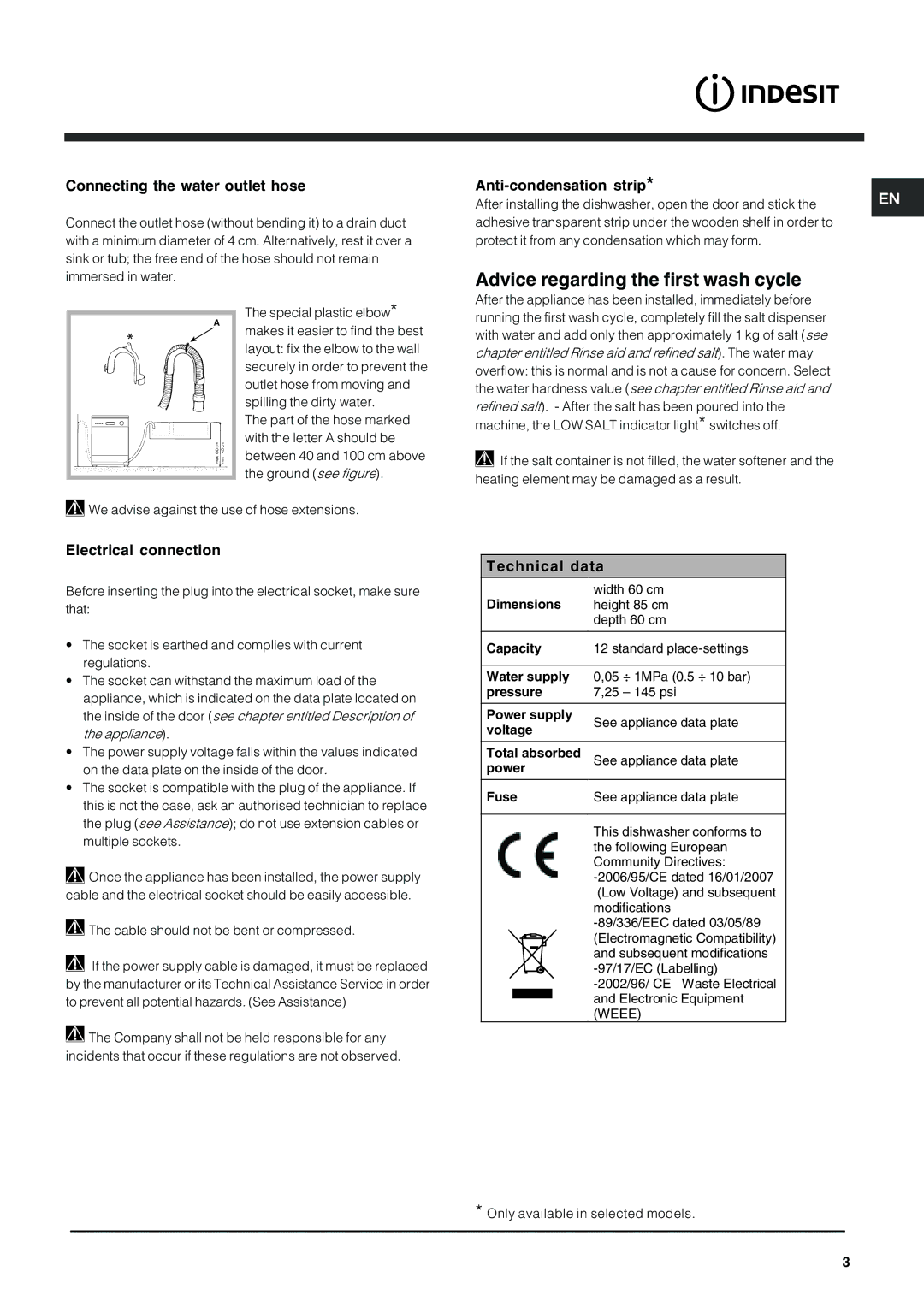
Connecting the water outlet hose
Connect the outlet hose (without bending it) to a drain duct with a minimum diameter of 4 cm. Alternatively, rest it over a sink or tub; the free end of the hose should not remain immersed in water.
Anti-condensation strip*
After installing the dishwasher, open the door and stick the | EN |
| |
adhesive transparent strip under the wooden shelf in order to |
|
protect it from any condensation which may form. |
|
Advice regarding the first wash cycle
A |
The special plastic elbow* makes it easier to find the best layout: fix the elbow to the wall securely in order to prevent the outlet hose from moving and spilling the dirty water.
The part of the hose marked with the letter A should be between 40 and 100 cm above the ground (see figure).
After the appliance has been installed, immediately before running the first wash cycle, completely fill the salt dispenser with water and add only then approximately 1 kg of salt (see chapter entitled Rinse aid and refined salt). The water may overflow: this is normal and is not a cause for concern. Select the water hardness value (see chapter entitled Rinse aid and refined salt). - After the salt has been poured into the machine, the LOW SALT indicator light* switches off.
![]() If the salt container is not filled, the water softener and the heating element may be damaged as a result.
If the salt container is not filled, the water softener and the heating element may be damaged as a result.
![]() We advise against the use of hose extensions.
We advise against the use of hose extensions.
Electrical connection
Before inserting the plug into the electrical socket, make sure that:
•The socket is earthed and complies with current regulations.
•The socket can withstand the maximum load of the appliance, which is indicated on the data plate located on the inside of the door (see chapter entitled Description of the appliance).
•The power supply voltage falls within the values indicated on the data plate on the inside of the door.
•The socket is compatible with the plug of the appliance. If this is not the case, ask an authorised technician to replace the plug (see Assistance); do not use extension cables or multiple sockets.
![]() Once the appliance has been installed, the power supply cable and the electrical socket should be easily accessible.
Once the appliance has been installed, the power supply cable and the electrical socket should be easily accessible.
![]() The cable should not be bent or compressed.
The cable should not be bent or compressed.
![]() If the power supply cable is damaged, it must be replaced by the manufacturer or its Technical Assistance Service in order to prevent all potential hazards. (See Assistance)
If the power supply cable is damaged, it must be replaced by the manufacturer or its Technical Assistance Service in order to prevent all potential hazards. (See Assistance)
![]() The Company shall not be held responsible for any incidents that occur if these regulations are not observed.
The Company shall not be held responsible for any incidents that occur if these regulations are not observed.
Technical data
Dimensions | width 60 cm | |
height 85 cm | ||
| depth 60 cm | |
|
| |
Capacity | 12 standard | |
|
| |
Water supply | 0,05 ÷ 1MPa (0.5 ÷ 10 bar) | |
pressure | 7,25 – 145 psi | |
|
| |
Power supply | See appliance data plate | |
voltage | ||
| ||
|
| |
Total absorbed | See appliance data plate | |
power |
| |
Fuse | See appliance data plate | |
|
| |
| This dishwasher conforms to | |
| the following European | |
| Community Directives: | |
| ||
| (Low Voltage) and subsequent | |
| modifications | |
| ||
| (Electromagnetic Compatibility) | |
| and subsequent modifications | |
| ||
| ||
| and Electronic Equipment | |
| (WEEE) |
*Only available in selected models.
3
